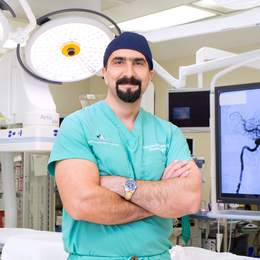
Surmounting Stroke
St. Mary Medical Center neurosurgeon Dr. Zakaria Hakma administers groundbreaking and potentially life-saving treatment for Bucks County residents affected by stroke.
Yardley resident James Potoka thought he was doing everything right. The 69-year-old husband, father, and financial advisor dutifully took his blood pressure medication and went to regular appointments with his primary physician and specialists. In July 2021, however, Potoka had a stroke.
“It wasn’t a stroke that knocked me over or anything like that,” he explains. “It was just kind of a sensation.”
Ten years prior to this event, Potoka had what appeared to be a TIA (transient ischemic attack) and spent a night in St. Mary Medical Center in Langhorne. Then, in March 2014, when a traumatic family event caused Potoka’s blood pressure to spike, he was admitted to St. Mary. In 2017, he was treated for a TIA, though tests proved inconclusive. The next four years passed without incident, until the medical event that would change—and ultimately save—his life.
On that fateful day in 2021, Potoka and his wife went to St. Mary’s emergency room where they met with Potoka’s cardiologist, Charles Paraboschi, M.D., who sought to target the problem. Dr. Paraboschi returned with a plan, Potoka recalls: “Charlie said to me, ‘We’ve got one guy who might be able to help you. It’s a new procedure; it’s been out less than five years.’”
That “one guy”: Zakaria Hakma, M.D., a dual-trained vascular surgeon on the medical staff of St. Mary Medical Center. Dr. Hakma was able to locate Potoka’s issue quickly—severe stenosis in the middle cerebral artery—and schedule surgery to resolve the issue for the following day.
“I did a thrombectomy,” Dr. Hakma explains. “Then I did a balloon angioplasty where I put a little balloon inside the artery that was blocked, blew up the balloon, opened up the artery, and put a stent in his middle cerebral artery.”
Remarkably, Potoka was able to go home the day after his surgery. He then underwent speech therapy for eight weeks as well as occupational and physical therapy. He was back to work three weeks later. Dr. Hakma says Potoka has been doing “phenomenally well since then,” having recovered approximately 90 percent of his previous function.
“All his symptoms have pretty much resolved,” he adds. “He’s one of the lucky ones. A lot of patients that we see don’t get the medical attention that quickly. If he didn’t come to the ER that day, he probably would have ended up with a much more devastating stroke … a life-altering stroke.”
When it comes to stroke, Dr. Hakma likes to say that “time is brain.” A person loses approximately 2 million brain cells every minute once a stroke occurs.
“Usually the brain ages about three or three and a half years every hour that you’re having a stroke,” Dr. Hakma says.
St. Mary opened an endovascular suite and is thrombectomy-capable. The hospital can treat all types of strokes, and is certified by The Joint Commission as a Primary Stroke Center.
Dr. Hakma refers to high blood pressure as “the silent killer.” For anyone who has had a stroke, a TIA, or a heart attack, he advises keeping a blood pressure monitor at home. He also recommends taking one’s blood pressure several times per week and recording the data in a journal.
“You should check your blood pressure routinely,” he adds. “Just because you’re taking a pill, it doesn’t mean your blood pressure is controlled.”
He advises people to remember FAST to vet the possible signs of a stroke, an acronym for face, arms, speech, and time. Specifically, look for facial changes or drooping, notice any drift or clumsiness in the arms, identify any slurring of speech or confusion when others are speaking, and note the time when symptoms began; getting to the hospital as soon as possible can make all the difference.
James Potoka sees Dr. Hakma every six months for follow-up appointments. Each time, he greets his doctor with a warm embrace to reflect his sincere gratitude. Potoka often tells Dr. Hakma, “God put you in [my life].”
He adds, “If I had this major stroke five years earlier, and this surgery wasn’t perfected, I would’ve been a dead man.”
The St. Mary Neuroscience Institute
St. Mary Medical Center
1201 Langhorne-Newtown Road
Langhorne, PA 19047
(215) 710-2000 | trinityhealthma.org/stroke
St. Mary Medical Center
1201 Langhorne-Newtown Road
Langhorne, PA 19047
(215) 710-2000 | trinityhealthma.org/stroke
Photo by Alison Dunlap
Published (and copyrighted) in Suburban Life magazine, May 2024.



